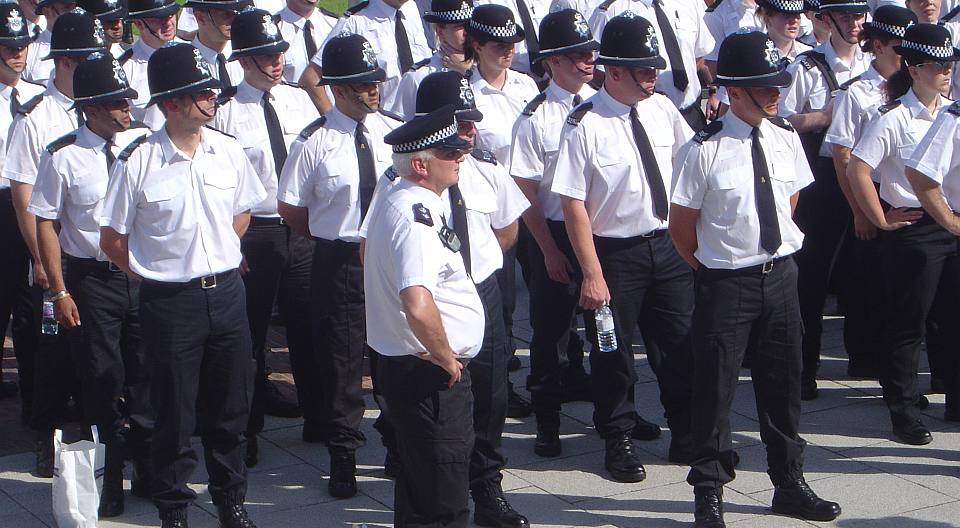Get the police off our tweets!
A senior British police officer has threatened to punish offensive speech online - where's the outrage over such Orwellianism?

Want to read spiked ad-free? Become a spiked supporter.
Police in Britain have just revealed that they are monitoring people’s tweets to check that they aren’t being offensive or abusive – where’s the outrage about this?
It came out of yesterday’s Twitter ugliness in response to tennis champ Andy Murray’s call for a Yes vote in the Scottish referendum. It’s hard to think of a more offensive tweet than the one aimed at Murray. A somewhat unhinged No supporter tweeted at him: ‘Wish u had been killed at Dunblane.’ Other tweeters said similarly shocking things. Murray was, as most people know, a pupil at Dunblane Primary School in 1996 when the massacre was carried out there. For someone to use the massacre against him simply because they disagree with him about Scottish independence is repulsive, speaking both to a lack of morals among the trolling community and to the depths of insult and counter-insult that the referendum debate sank into in its final days.
Yet while some of the tweets were repulsive, were they illegal? For some reason the police have got involved in this Twitterspat. According to one report, police have ‘launched an investigation’ into these ‘offensive and abusive messages’. Why? Even tweets which did not make any kind of death threat against Murray – which would have been illegal – are apparently being investigated. A chief constable at Police Scotland slammed the anti-Murray tweets for being ‘vile, disgusting and distasteful’, which raises a very pressing question: since when was the quality of public debate any concern of the police?
More worryingly still, Police Scotland says it is ‘monitoring’ tweets relating to Andy Murray and that it will ‘take action’ against some of them, on the basis that ‘social media is important for many people but it must be used responsibly. There is no place for personal abuse of any kind on it.’ Wow.
This should worry us. A lot. For what we have here are police explicitly monitoring public discussion and threatening to take action against those they judge to be offensive or abusive. For the police to insist that ‘there is no place for personal abuse of any kind’ on Twitter and other social-networking sites is shocking. Who are they to make such a decree? Would these police threats against personal abuse also extend to clamping down on tweeters who call someone a cow or a twat? What if someone calls the police ‘filth’? Is that abusive, or a political statement? The police have no right to monitor the tone and quality of public debate, or the content, and we should not sit back and nod along as a very senior police officer threatens to do just that.
We are outraged, rightly, when we hear of blasphemous tweets being punished in Pakistan or when we read about Chinese officials monitoring social networks for signs of political dissent. Yet we seem scarily chilled out about the fact that police here are openly doing something very similar – monitoring social media, not in search of criminal activity, but simply to uncover and potentially punish the use of offensive and shocking words and maybe even ‘personal abuse of any kind’. Just because the tweets about Murray were grossly offensive, that doesn’t mean we should switch off our critical faculties and accept the right of police to investigate such offensiveness, for that sets a very dangerous precedent indeed. What if the cops later decide that posting grotesque, mocking cartoons of politicians is offensive, or that expressing religious opposition to homosexuality is abusive? If we allow them to punish trolls simply for causing offence, we implicitly invite them to monitor all forms of speech in search of the shocking and disturbing. And that way a police state lies. ‘Get the police off our streets!’, radicals demanded in the Seventies and Eighties. Today we need a new cry: ‘Get the police off our tweets!’
Brendan O’Neill is editor of spiked. He will be speaking at the debate Should we fear democracy? at the Battle of Ideas festival, held at the Barbican in London on 18-19 October. Get tickets here.
Who funds spiked? You do
We are funded by you. And in this era of cancel culture and advertiser boycotts, we rely on your donations more than ever. Seventy per cent of our revenue comes from our readers’ donations – the vast majority giving just £5 per month. If you make a regular donation – of £5 a month or £50 a year – you can become a and enjoy:
–Ad-free reading
–Exclusive events
–Access to our comments section
It’s the best way to keep spiked going – and growing. Thank you!







Comments
Want to join the conversation?
Only spiked supporters and patrons, who donate regularly to us, can comment on our articles.